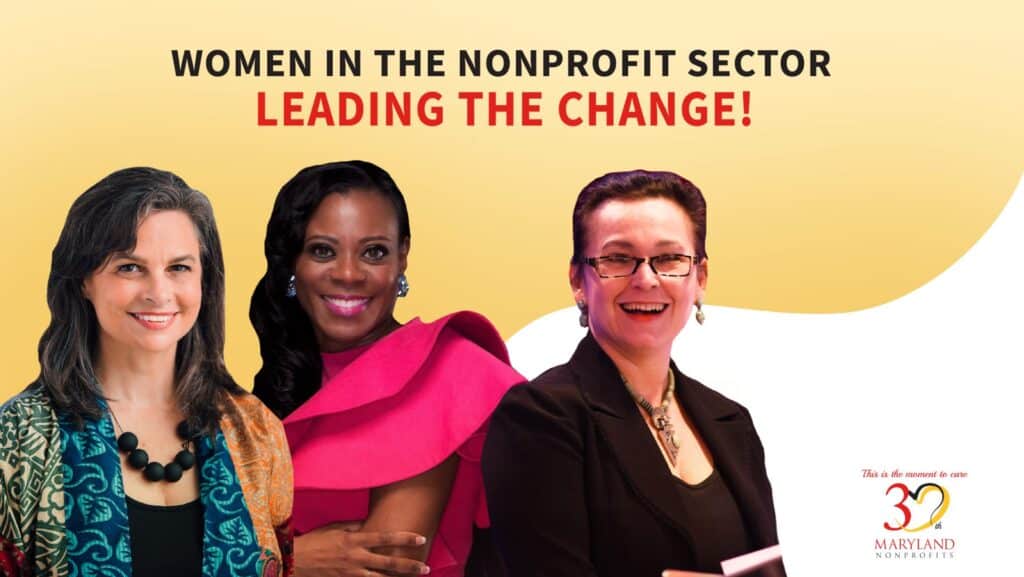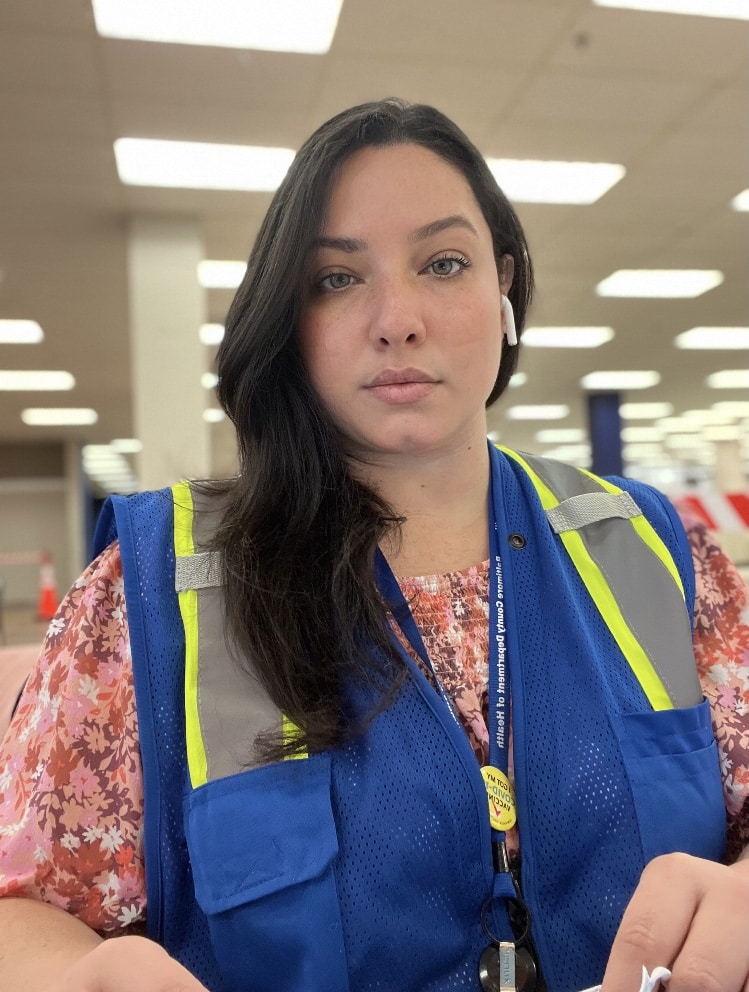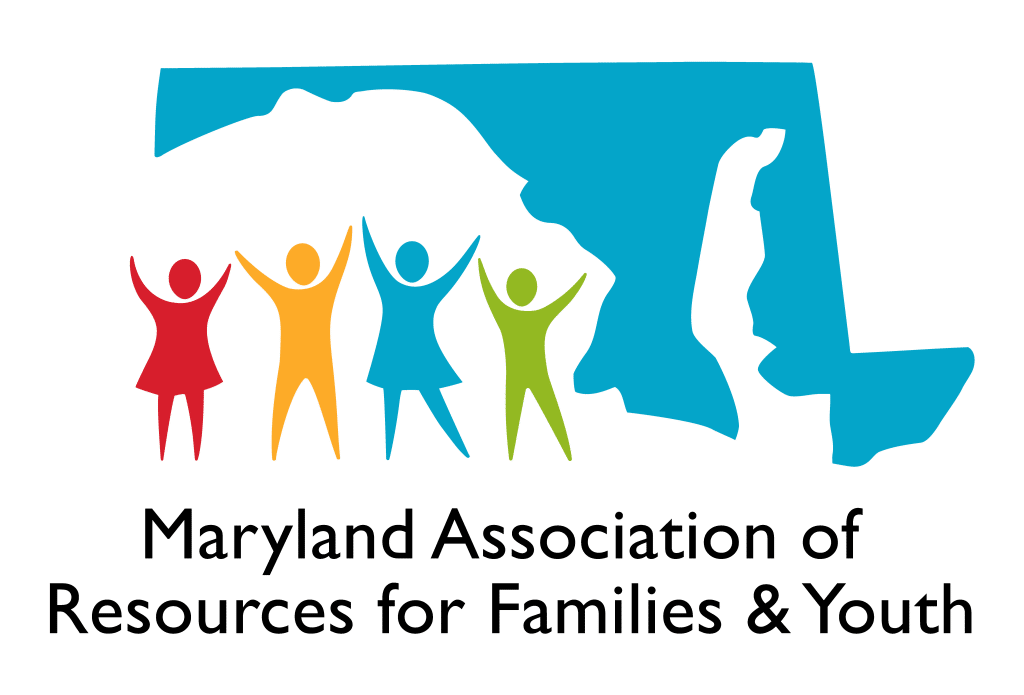Contrary to popular belief, research shows that women hold the majority of executive director positions in nonprofit organizations, with our recent survey showing as high as 70%. At Maryland Nonprofits, we have the luxury of having an abundance of women leaders! In addition to our President and CEO Heather Iliff, the Maryland Association of Resources for Family and Youth (MARFY) and Maryland Latinos Unidos (MLU) are all led by women! Before we close out Women’s History Month, it is only right that we honor their fantastic leadership and take a dive into their experience.
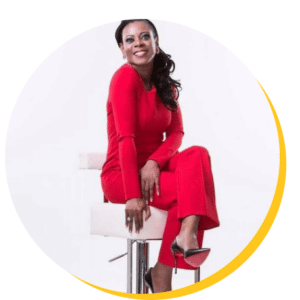 Keron R. Sadler is the Executive Director of the Maryland Association of Resources for Families and Youth (MARFY), an association of private child-caring organizations providing foster care, group homes, and other services through more than 200 programs across the state. MARFY empowers the provider community to advocate for a system of care in Maryland that meets the needs of children and families.
Keron R. Sadler is the Executive Director of the Maryland Association of Resources for Families and Youth (MARFY), an association of private child-caring organizations providing foster care, group homes, and other services through more than 200 programs across the state. MARFY empowers the provider community to advocate for a system of care in Maryland that meets the needs of children and families.
As a little girl, Keron always knew she was destined for leadership. She looked to the leaders of her family who were all women. She saw her mother working two jobs to support a full household and maintained multiple female role models throughout her life. In her early childhood, she would play house and assign herself the role of the teacher. Keron would write out a real lesson plan and be dedicated to the success of her community of dolls.
In real school, she remembers always standing up to bullies that preyed on those they thought were weak. This was the beginning of her lifelong mission to advocate for the underdog, and the communities that are overlooked and under responded to when they are in need. It’s no surprise that she is leading the fight in Maryland for children and families in the foster care system.
As a Black woman leader, Keron has experienced an intersectional array of challenges. Although she is noticing an upward trend of Black women becoming executive directors, she finds that in her field of childcare, the chain of leadership has always started with White men at the top, then White women, then Black women or WOC. Many times, her passion, and the way she shows up for the work she does are misunderstood as anger, aggression, or combativeness, which poses a challenge to her and countless other Back women who experience the same thing in their place of work.
She notes that when working with different people and different cultures, you will encounter people who show up differently to get the same job done successfully, and it’s important to embrace those differences. As a Black lesbian with a background in clergy and the military, she faces all kinds of “isms” and says that they drive her to go harder and reach new levels of success.
Keron, affectionately known as Lady Keron, wants to be remembered for giving back, and not being afraid to use her voice for those who may not be able to. She wants to be a resource to everyone, but specifically Black and Brown leaders who aim to make a positive difference in their field. She wants to be an example for Black lesbian professionals and amplify those voices and all the voices of those who are overlooked. She leaves young girls who aspire to one day be leaders with this:
“I hope younger women will know their self-worth, demand their respect in the workplace, and walk firmly with their head high believing in themself and never giving up on themselves”.
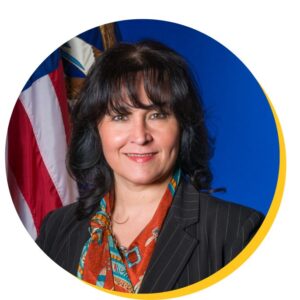 Gabriela Lemus is the executive director of Maryland Latinos Unidos (MLU), a statewide network of organizations, businesses, and individuals who support Latino and immigrant communities. MLU works within and with Maryland’s Latino/Hispanic community by supporting Latino-serving nonprofits, convening around public policy priorities, and working together for a common cause.
Gabriela Lemus is the executive director of Maryland Latinos Unidos (MLU), a statewide network of organizations, businesses, and individuals who support Latino and immigrant communities. MLU works within and with Maryland’s Latino/Hispanic community by supporting Latino-serving nonprofits, convening around public policy priorities, and working together for a common cause.
As a child, Gabriela was told she could never be the president of the United States because she was born in Mexico. Why not become the president of Mexico you ask? Gabriela was very conscious that women could not do much in Mexico politically. That ignited a fire in her early on to beat the odds set against her. By eight years old she was determined to become the highest position of leadership in the United States that she could obtain, Secretary of State. Gabriela admits that her goal has carried her throughout her life as a leader. Today, she specializes in US-Latin America relations, and she uses her passion for anthropology as a cultural lens to observe how the progression of culture impacts us all today.
“A Latina leader is no ‘easy picnic’”, Gabriela laughed as she was asked about the challenges she faces as a woman leader. The fact that she had to get a doctorate to even get her foot in the door Gabriela said, was just the beginning. In her experience as a Latina woman, when Gabriela would show up to the workplace with ambition and vigor she would be labeled as aggressive, arrogant, and intimidating. She has found that people don’t encourage kindness in her work, which poses a big challenge because she refuses to participate in the building of a society that is not kind. Kindness, integrity, and ethics are more important to Gabriela than getting the deal done because if the deal lacks these principles, it must not be meant to be.
She has recently concluded that she is a ‘disruptor by nature’ and has learned that much of the time when women are faced with a challenge, they usually are given little to no tools for success. This she believes is where women pull from their resourcefulness that every woman would agree is ingrained in them to figure it out, which is always a challenge no matter how well we do in the end.
Gabriela wants to open doors and build lots of stairwells to success for young girls who aspire to be in the position of leadership that she is in today. She wants young girls to have all types of opportunities, and not be limited as she felt she was coming up in her career. Personally, she has mentored many young Latina women into successful positions of power, including state and federal government positions. She believes that if she doesn’t have a pipeline of young women that can succeed her when her time is up then she has failed because her leadership wouldn’t have been sustainable.
As a Latina leader, Gabriela wants her legacy to be the young people that she mentors. She doesn’t have children, so she feels personally responsible for the success of up-and-coming Latino leaders. She leaves us with this quote from the first Black Woman in Congress Shirley Chisholm: “If they don’t give you a seat at the table, bring a folding chair,” and confirms she has an array of folding chairs.
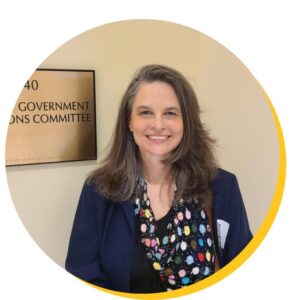 Last but certainly not least, our President and CEO Heather Iliff, who, as a little girl, jumped into leading things before she even knew what being a leader meant. In third grade, she started a club to clean up the environment. There were public service announcements at the time, from Woodsy Owl, that said, “Give a Hoot, Don’t Pollute”. She created a Woodsy Owl club, picked up trash in the neighborhood, and got a friend’s artist-mom to create a coloring book about noise pollution.
Last but certainly not least, our President and CEO Heather Iliff, who, as a little girl, jumped into leading things before she even knew what being a leader meant. In third grade, she started a club to clean up the environment. There were public service announcements at the time, from Woodsy Owl, that said, “Give a Hoot, Don’t Pollute”. She created a Woodsy Owl club, picked up trash in the neighborhood, and got a friend’s artist-mom to create a coloring book about noise pollution.
By high school, Heather was elected president of the Chesapeake Regional Association of Student Councils, became a student member of the Anne Arundel County Board of Education, served on the board of the National Council of Student Councils, and traveled to the Soviet Union to meet Mikhail Gorbachev and students from around the globe calling for peace and an end to the Cold War.
Now the President and CEO of Maryland’s nonprofit state association, Heather finds that the many well-documented ways it is more difficult to be a woman in general overlap with challenges in the workplace.
“Having responsibility for pregnancy, childbirth, and usually the majority of childcare and household duties, all make it more difficult for women to do those ‘extra’ things that enable many men to get ahead. For example, that 7:30 AM power breakfast, or schmoozing on the golf course are options that are not easily doable for many women and can make a big difference in fundraising. Women are more likely to have chronic physical and mental health challenges, and life as a woman is more expensive – be it health costs, the ‘pink tax’ and other barriers that all women face in life has an effect on leaders as executive directors.”
In the past, there was a trend of men making up most of the leadership positions in the nonprofit sector while most of its employees were women. Today, that is not the case as Heather points out.
“Our data shows that women hold the majority of executive director positions in nonprofit organizations, with our recent survey showing as high as 70%. I think things are starting to change as women start to realize leadership gifts come in a variety of shapes and sizes.”
“Many women, myself included, have attempted to mold ourselves into the type of leader we are most used to seeing in the press, movies, and leadership books, modeled on an industrial-era, white-male leader. With the rise of authors like Brene Brown who brings a research lens to show that empathy, compassion, and vulnerability, traditionally considered more feminine traits, are actually important leadership qualities, more women are starting to lead in ways that have not always been appreciated by male-dominated workplaces”, she adds.
When asked why she thinks the nonprofit sector is mostly women-driven, Heather illuminated the fact that the nonprofit sector was largely founded by wealthy white women who found meaningful roles for themselves as philanthropists, founders of orphanages and schools, and other acts of charity. She goes on to explain how White supremacy and the ‘white savior’ syndrome developed out of this sense that those who need help are ‘less than’ and those bringing help are venerated and gain a halo effect that uplifts their status in White society. “The vestiges of this history are alive today, where white women dominate in the charitable sector, bringing stereotypes and assumptions about communities in need that can be disempowering and harmful.”
She shared the article “White Women doing White Supremacy” which unpacks how much we must reexamine ourselves to undo racism and this legacy that is backed into the nonprofit sector. Heather acknowledges that women of color have not had access to the same kind of recognition and funding, and yet for generations have overcome to lead and create social change through organizing. As a white woman who holds both power and unearned privilege in this nonprofit sector, she aims to be a force for equity and change.
Heather believes that the solution to every problem in society is held within nonprofits. Whether it’s climate change, childhood hunger, social injustice, or scientific discovery, nonprofits hold the keys to a prosperous and just future. However, nonprofits are not yet operating at scale, and are reproducing systemic inequities in our nonprofit system.
She hopes that her legacy will be to find ways to scale up the work of the nonprofit sector in an equitable way so that we can end all the self-inflicted problems humans have created for ourselves and build an economy and society that achieves well-being for everyone.
To the young women who aspire to be a leader one day, Heather leaves them with this piece of advice:
“Try to cultivate a new superpower, which is understanding and seeing what your own superpowers are, and try to ascertain the amazing gifts of those around you and uplift them. Active listening and humility are as important as great communication and confidence.”
